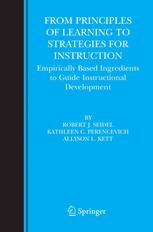

Most ebook files are in PDF format, so you can easily read them using various software such as Foxit Reader or directly on the Google Chrome browser.
Some ebook files are released by publishers in other formats such as .awz, .mobi, .epub, .fb2, etc. You may need to install specific software to read these formats on mobile/PC, such as Calibre.
Please read the tutorial at this link: https://ebookbell.com/faq
We offer FREE conversion to the popular formats you request; however, this may take some time. Therefore, right after payment, please email us, and we will try to provide the service as quickly as possible.
For some exceptional file formats or broken links (if any), please refrain from opening any disputes. Instead, email us first, and we will try to assist within a maximum of 6 hours.
EbookBell Team

5.0
108 reviewsThe purpose of this volume is to help educators and training developers to improve the quality of their instruction. Unlike other books, which have appeared so far, this volume is not limited to a particular theoretical position. Nor is it like many of the instructional design texts, which ignore the learning literature. Rather, it draws upon any and all of those research-based principles regardless of learning theory, which suggest heuristics to guide instructional strategies. The approach of the authors is unique in that they develop a framework or model taxonomy for tasks, through which the principles of learning can be related to particular learning processes, suggesting distinctive strategies for specific instructional tasks. The authors present a four-stage model that includes Acquisition, Automaticity, Near Term Transfer, and Far Term Transfer.
The book is a practical guide for developing instructional strategies across the four principal domains, cognitive, affective, psychomotor, and interpersonal; and is backed by empirically supported learning principles. It is useful both to the experienced as well as the novice developer (e.g. the student).
"The current volume strikes a nice balance between theory and practice and provides a straightforward model of instruction that is easily connected with relevant research but equally easy to apply to instructional development projects… The detailed treatment of the interpersonal domain and the emphasis on technology integration clearly distinguish the book as a modern treatment of instructional development that goes well beyond traditional instructional system development models… Therefore, this volume should provide a well-grounded and useful tool for instructional developers."
From the Preface by Michael Spector, Florida State University.
"This book represents a major milestone in the literature on learning because it brings together research from the fields of psychology, education, and the training in a format which is highly useful to practitioners. It will be very valuable to teachers, trainers, students, and researchers alike."
Greg Kearsley, University of Wisconsin, Madison and, UMUC, University of Maryland.